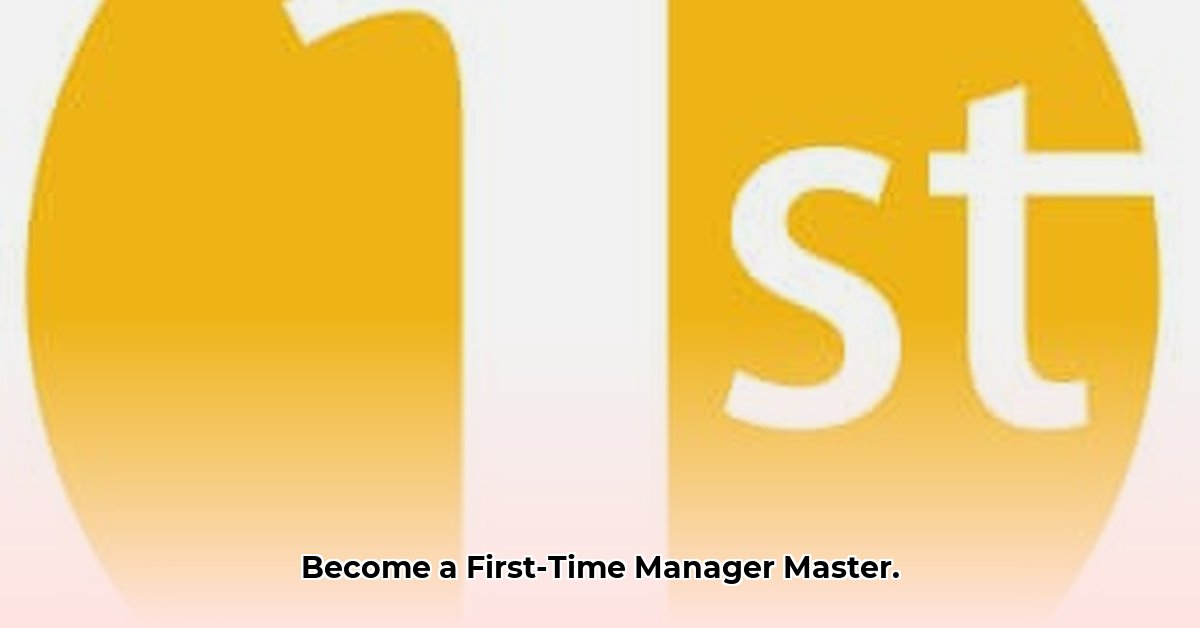Congratulations on becoming a new manager! While exciting, it can also feel like navigating uncharted waters. This guide serves as your compass, leading you through the complexities of team management, from handling challenging situations to fostering collaboration and driving exceptional results. We’ll share actionable strategies, avoid confusing jargon, and leverage insights from leading management experts. This practical, easy-to-follow roadmap will help you build a thriving team and excel in your new role.
First-Time Manager Training: Your Roadmap to Success
Landing your first management role is a significant achievement. It’s a step up that comes with new challenges and opportunities. Many new managers experience a period of adjustment as they learn to navigate their responsibilities. This guide provides you with the essential skills and strategies to not only navigate this transition but to excel as a leader. We’ll equip you with vital management skills and effective leadership development strategies.
Overcoming Initial Challenges: Common Obstacles
The transition from individual contributor to manager requires a significant shift in both mindset and skillset. Many new managers struggle due to a lack of adequate support and training. This can lead to decreased team morale, reduced productivity, and increased employee turnover. Investing in comprehensive first-time manager training is crucial. Think of it as earning your managerial driver’s license before getting behind the wheel.
The Six Essential Shifts: Mindset and Skillset
Mastering these six key areas will set you up for success. These are the essential tools in your managerial toolbox, with a focus on performance management, team building, and crucial interpersonal skills:
- Delegation: Empowering Your Team: Avoid the urge to do everything yourself. Learn to trust your team members and delegate tasks effectively. Micromanaging hinders growth and breeds resentment. Assign tasks based on individual strengths and provide clear expectations to foster team empowerment.
- Communication: Building Bridges: Clear, consistent, and empathetic communication is the foundation of a cohesive and productive team. This goes beyond just sending emails; it involves active listening, understanding different perspectives, and building strong relationships. Schedule regular one-on-one conversations and team meetings to encourage open dialogue.
- Feedback: Fueling Growth: Master the art of providing both constructive criticism and positive reinforcement. Regular feedback, delivered effectively, keeps your team engaged and motivated. Frame feedback as an opportunity for growth and development.
- Conflict Resolution: Turning Discord into Harmony: Disagreements are inevitable in any team. Learn to address conflicts promptly and fairly. Focus on finding mutually acceptable solutions that preserve relationships and maintain team cohesion.
- Time Management: Maximizing Productivity: As a manager, your time is a valuable resource. Prioritize tasks, delegate effectively, and eliminate time-wasting activities. Help your team do the same by providing them with the tools and strategies they need to manage their time effectively.
- Decision-Making: Leading with Confidence: As a manager, you’ll be faced with countless decisions, big and small. Develop a structured approach to decision-making, weighing the pros and cons of each option and considering the impact on your team.
Building a Strong Foundation: Practical Steps
First-time manager training should be practical and actionable. Here’s a roadmap to help you develop your leadership skills:
- Formal Training Programs: Enroll in training programs specifically designed for new managers. Look for programs with a strong reputation, positive testimonials, and a focus on practical skills development. These programs often include structured learning modules, real-world case studies, and opportunities for practice and feedback.
- Mentorship: Learning from Experience: Seek guidance from an experienced manager who can serve as a mentor. A mentor can provide invaluable support, advice, and insights that you won’t find in textbooks. They can offer a sounding board for your challenges and celebrate your successes.
- Continuous Learning: A Lifelong Pursuit: Your management journey is a continuous learning process. Actively seek opportunities to enhance your skills. Explore books, articles, online courses, and industry events to stay curious and engaged, constantly expanding your management expertise.
Resources for Success: Tools and Techniques
Many resources are available to support your leadership development, from fostering employee motivation to mastering conflict management and remote team management:
- Online Courses: Numerous online platforms offer excellent first-time manager training courses. Look for courses with engaging content, interactive exercises, and practical applications. Platforms like Coursera, LinkedIn Learning, and Udemy offer a wide variety of options.
- Books and Articles: Explore reputable business publications and management books. Harvard Business Review, Forbes, and The Wall Street Journal often publish insightful articles on management best practices. Books like “The 7 Habits of Highly Effective People” and “Good to Great” offer timeless principles for leadership success.
- Workshops and Seminars: Attend workshops and seminars to network with other managers and learn from experts in the field. Industry events like SHRM conferences and ATD workshops provide opportunities for collaboration and shared learning.
Measuring Success: Key Performance Indicators (KPIs)
Tracking key performance indicators is crucial for measuring your success. Here are some important KPIs to monitor, from enhancing decision-making skills to promoting team collaboration and developing effective delegation strategies:
- Team Performance: Monitor your team’s productivity, output quality, and project completion rates. These metrics provide valuable insights into the effectiveness of your management style.
- Employee Satisfaction: Regularly assess employee morale, engagement, and retention. Happy, engaged team members are more likely to be productive and committed. Use surveys, feedback sessions, and one-on-one meetings to gauge employee satisfaction.
- Conflict Resolution: Track the frequency and resolution time of conflicts. Efficient conflict resolution demonstrates your communication and problem-solving skills.
- Employee Growth and Development: Track the progress of your team members’ skills and career development. Are they taking advantage of training opportunities? Are they taking on new challenges? Their growth reflects your ability to develop your team.
The Long View: Sustaining Success
Being a successful manager is an ongoing journey, not a one-time achievement. Continuous self-improvement is essential for long-term leadership growth.
- Continuous Skill Development: Always look for ways to enhance your leadership skills through continued professional development. Attend workshops, read industry publications, and seek out new learning opportunities.
- Proactive Feedback: Regularly solicit feedback from your team and supervisors to identify areas for improvement. Be open to constructive criticism and use it to refine your management approach.
- Adaptability: Be prepared to adapt your management style based on the evolving needs of your team. What works for one team member may not work for another. Tailor your approach to meet the individual needs of your team.
Remember, effective management is a continuous process of learning, adapting, and growing. Embrace the challenges, celebrate your successes, and have confidence in your ability to lead your team to success.
Improving Team Performance with Domain-Specific KPIs
Key Takeaways:
- Aligning Key Performance Indicators (KPIs) with team goals and organizational strategies is crucial.
- The SMART framework (Specific, Measurable, Achievable, Relevant, Time-bound) guides effective KPI development.
- Regular monitoring and communication are essential for goal setting.
- Avoid using too many KPIs.
- New managers should focus on process KPIs to build team competency.
- Engage stakeholders, understand expectations, and involve your team.
- Review and adjust KPIs based on performance and changes.
Understanding Your Team’s Context
Before selecting KPIs, understand your team’s unique context. What are their key responsibilities? What are the overall goals of the department and the organization? This assessment is foundational for selecting relevant metrics to create a high-performing team.
Defining and Choosing Effective KPIs
What truly matters for your team’s success? Use strategic selection with data analysis techniques. Remember the SMART framework: Specific, Measurable, Achievable, Relevant, Time-bound. Each KPI should meet these criteria.
Select the Right Mix: New managers benefit from focusing on process KPIs, which track efficiency and quality (e.g., customer response time, project completion rate, or defect rate). As the team develops, add outcome KPIs, focusing on end results, like sales revenue or customer satisfaction.
Involve Your Team: Collaborate on defining KPIs to foster buy-in, increase accountability, and leverage their expertise.
Implementing and Monitoring
Ensure everyone understands the KPIs. Communicate regularly. Use dashboards, check-ins, and meetings to monitor progress and address challenges.
Address Challenges: If goals aren’t met, re-evaluate KPIs, identify bottlenecks, and provide support. Are goals too ambitious? Are resources needed? Open communication and proactive problem-solving are essential.
Adapt to Change: Business environments shift. Update KPIs accordingly. Flexibility is key to long-term KPI success.
Case Study: Enhancing Customer Service
Consider a customer service team. Instead of focusing only on the number of calls handled (an outcome KPI), also track customer satisfaction scores (outcome) and average call handling time (process). Improving call times through better training can improve both metrics.
Proven Tactics For Effective Stakeholder Management
Key Takeaways:
- Identify and prioritize stakeholders based on their influence and interest.
- Communicate proactively and transparently, tailoring messages to different audiences.
- Build strong relationships based on trust, respect, and mutual understanding.
- Manage expectations by clearly defining roles, and responsibilities and setting realistic timelines.
- Actively solicit and respond to feedback from stakeholders to identify and address concerns.
- Leverage technology and tools to facilitate communication and collaboration.
Identifying Your Stakeholders
Start by identifying everyone
- Top Rated Meditation Books to Deepen Your Practice - February 5, 2026
- Good Mindfulness Books For A Calmer, Happier Everyday Life - February 4, 2026
- Recommended Meditation Books for Beginners and Experienced Practitioners - February 3, 2026
















